Energy transition in the construction industry
The energy transition law officially published on 18 August 2015 aims to contribute effectively to the fight against global warming
In the context of a shared struggle against global warming and as a continuation of a sustainable development approach, the energy transition law officially published on 18 August 2015 aims to contribute effectively to the fight against global warming, the preservation of As well as to reinforce France's energy independence while at the same time having prices for access to energy that remain competitive
Reducing energy consumption in buildings is paramount. Indeed, the "residential and tertiary buildings" sector alone accounts for 46% * of the energy consumed in France, making it the most energy-intensive sector in the country and therefore an essential sector for the reduction of energy
The law sets medium-term objectives:
-Reduce final energy consumption by 50% in 2050 compared to 2012
- Increase the share of renewable energies to 23% of gross final energy consumption by 2020 and to 32% by 2030, reaching 40% for electricity, 38% for heat, 15% for fuel And 10% for gas.
-Accelerate the energy renovation of homes
- To significantly improve the energy performance of new buildings, in particular to achieve, to a minimum, energy performance in compliance with the "low consumption building" (BBC) standards for the entire housing stock by 2050.
-Fighting against fuel poverty
Highlights
The Energy Transition Act for Green Growth (LTECV) covers the various key areas of the energy transition and contains many measures:
-The obligation since January 2017 to insulate the public buildings during renovations (roof repair, facade refurbishment, fitting up of attic) to significantly improve energy performance.
- Improve the energy and environmental performance of new buildings. These must be exemplary in terms of energy consumption from a building with efficient insulation.
- The development of renewable energies with the simplification of procedures (hydroelectric concessions and support systems for mature electric energy).
- Simplification of procedures and clarification of the regulatory framework (new method of calculating regulated tariffs, new measures to guarantee competitiveness, limitation of time limits for redress, clarifications of responsibilities ...)
* http://isolonslaterre.com/spip.php?rubrique37


 Aluminium flashing system for flat roof tops
Aluminium flashing system for flat roof tops Roof edging and parapet wall raising piece system
Roof edging and parapet wall raising piece system Aluminium parapet extension and facade band system
Aluminium parapet extension and facade band system Aluminum coping systems
Aluminum coping systems Rainwater collector and drainage system
Rainwater collector and drainage system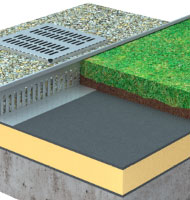 Gravel protection strips and boxes
Gravel protection strips and boxes Mechanical protection system for expansion joints
Mechanical protection system for expansion joints Supporting structure for mechanical equipment on roofs
Supporting structure for mechanical equipment on roofs Système de structure support en toiture terrasse
Système de structure support en toiture terrasse Freestanding machine dressing system on roofs
Freestanding machine dressing system on roofs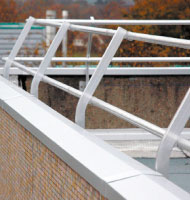 Aluminium safety guardrail for flat roofs without public access
Aluminium safety guardrail for flat roofs without public access Aluminium guardrail for flat roofs without public access
Aluminium guardrail for flat roofs without public access Aluminium height-adjustable saftey guardrail for flat roofs without public access
Aluminium height-adjustable saftey guardrail for flat roofs without public access Échelles à crinoline et sauts de loup
Échelles à crinoline et sauts de loup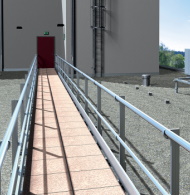 Safe walk way and emergency escape way
Safe walk way and emergency escape way Roof lights safety railing system
Roof lights safety railing system Freestanding demarcation system on roofs
Freestanding demarcation system on roofs Guardrail with decorative filling
Guardrail with decorative filling Garde-corps à remplissage décoratif filant
Garde-corps à remplissage décoratif filant Steel design guardrail
Steel design guardrail Handrail on squire
Handrail on squire Separator for balconies and roof-tops
Separator for balconies and roof-tops Aluminium weather drips for external walls and balcony edges
Aluminium weather drips for external walls and balcony edges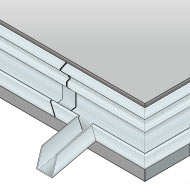 Gutter and drainage of balconies
Gutter and drainage of balconies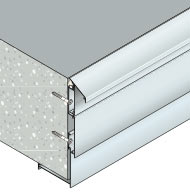 Adjustable cladding system to protect balcony edges
Adjustable cladding system to protect balcony edges Customized cladding system to protect slab edges
Customized cladding system to protect slab edges Tiling weather drips and protection of balcony edges
Tiling weather drips and protection of balcony edges Finishing profiles for liquid waterproofing systems
Finishing profiles for liquid waterproofing systems Facade sealing system
Facade sealing system Adjustable profiles for the insulation of facades
Adjustable profiles for the insulation of facades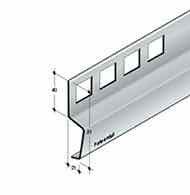 Flashing system for coated facades
Flashing system for coated facades Grab bar system
Grab bar system Window support system
Window support system Window support system for insulated facades
Window support system for insulated facades Système d'appui de fenêtre pour construction à ossature ou bardage bois
Système d'appui de fenêtre pour construction à ossature ou bardage bois Accessibility solutions for those with reduced mobility
Accessibility solutions for those with reduced mobility Drainage system for surface water
Drainage system for surface water